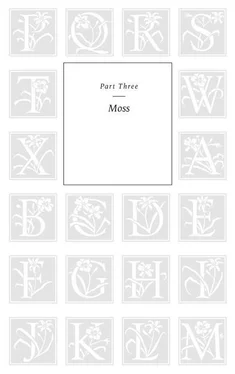Vanessa Diffenbaugh - The Language of Flowers
Здесь есть возможность читать онлайн «Vanessa Diffenbaugh - The Language of Flowers» весь текст электронной книги совершенно бесплатно (целиком полную версию без сокращений). В некоторых случаях можно слушать аудио, скачать через торрент в формате fb2 и присутствует краткое содержание. Жанр: Старинная литература, на английском языке. Описание произведения, (предисловие) а так же отзывы посетителей доступны на портале библиотеки ЛибКат.
- Название:The Language of Flowers
- Автор:
- Жанр:
- Год:неизвестен
- ISBN:нет данных
- Рейтинг книги:4 / 5. Голосов: 1
-
Избранное:Добавить в избранное
- Отзывы:
-
Ваша оценка:
- 80
- 1
- 2
- 3
- 4
- 5
The Language of Flowers: краткое содержание, описание и аннотация
Предлагаем к чтению аннотацию, описание, краткое содержание или предисловие (зависит от того, что написал сам автор книги «The Language of Flowers»). Если вы не нашли необходимую информацию о книге — напишите в комментариях, мы постараемся отыскать её.
The Language of Flowers — читать онлайн бесплатно полную книгу (весь текст) целиком
Ниже представлен текст книги, разбитый по страницам. Система сохранения места последней прочитанной страницы, позволяет с удобством читать онлайн бесплатно книгу «The Language of Flowers», без необходимости каждый раз заново искать на чём Вы остановились. Поставьте закладку, и сможете в любой момент перейти на страницу, на которой закончили чтение.
Интервал:
Закладка:
“No,” he admitted. “My mother did when I was young, before she began to spend most of her days in bed. I always pruned her roses just as she taught me, though, hoping the view from her window might beckon her into the kitchen. Only once did it work, the Thanksgiving before she died. Now that she’s gone, I just do it out of habit.”
I tried to remember whether Thanksgiving had already passed or if it was in the coming week. I paid little attention to holidays, although in the flower business they were hard to ignore. It must still be approaching, I thought. When I looked up, Grant was looking at me as if he was awaiting a response. “What?” I asked.
“Do you know your biological mother?”
I shook my head. He started to ask something else, but I cut him off. “Really. Don’t waste your time asking—I don’t know any more about her than you do.” I walked away and knelt on the ground, holding the camera’s viewfinder up to my eye. I snapped a blurry photo of knobby old wood and the tops of deep roots.
“It’s manual. Do you know how to use it?” I shook my head. He pointed to the buttons and dials, defining photography terms I had never heard. I was paying attention only to the distance of his fingers from the camera hanging around my neck. Whenever he got too close to my chest, I took a step back.
“Try it,” Grant said when he was done explaining. I held the camera up again and turned a dial to the left. An open pink blossom went from blurry to unrecognizable. “Other way,” Grant said. I turned the dial to the left again, ruffled by his voice too close to my ear.
His hand closed around mine, and together we turned the dial to the right. His hands were soft and did not burn where they touched. “Yeah,” he said. “That’s right.” He lifted my other hand to the top of the camera and pressed my index finger onto a round metal button. My heart stopped and started again. The lens clicked open and shut.
Grant withdrew his hands, but I did not lower the camera. I didn’t trust my face. I didn’t know if he would see joy or hatred in my eyes, fear or pleasure written on my bright-red cheeks. I didn’t know what I felt except breathless.
“Wind the film to take another picture,” he said. I didn’t move. “Want me to show you?”
I stepped back. “No,” I said. “That’s enough.”
“Too much information for one day?” Grant asked.
“Yes,” I said. I took off the camera and handed it to him. “Way too much.”
We walked back toward the house. Grant did not invite me inside. He walked straight to his truck and opened the passenger door, holding out his hand to me. I paused and then took it. He helped me inside and closed the door.
We drove back to the city in silence. It began to rain, slowly at first, and then with a blinding, unexpected ferocity. Cars pulled over to wait out the storm, but it only strengthened. It was the first strong rain of the fall, and the earth opened to its long-awaited watering, releasing a metallic scent. Grant drove slowly, guided by his memory of the turns rather than the sight of the road. The Golden Gate Bridge was deserted. Water rose from the bay and fell from the sky with equal force. I imagined the water coming into the car, the level rising over our feet, knees, stomachs, and throats as we drove.
Nervous to reveal the location of Natalya’s apartment, I asked Grant to drop me off in front of Bloom. It was still raining when he stopped in front of the store. I don’t know if he waved; I couldn’t see him through the water on the windshield.
Natalya and her band were setting up their instruments when I opened the door, and they nodded at me as I slipped up the stairs. Pulling my keys out of my backpack, I opened my small door, crawled inside, and curled up on the floor. The water from my wet clothes soaked into the fur carpet, and the whole world was wet and blue and cold. I shivered with my eyes wide open. I wouldn’t sleep that night.
4 .
“Ready?” Elizabeth asked .
I was surprised to see the short distance we’d traveled. Elizabeth had parked behind a locked metal gate, in a driveway. To the right was the parking lot where the farmers’ market was held, and just beyond that, the vineyard. Somewhere beyond the vast expanse of asphalt, I realized, the two properties likely connected.
Stepping out of the truck, Elizabeth withdrew a skeleton key from her pocket. She slipped the key into the lock, and the gate swung open. I waited for her to come back to the truck, but she beckoned for me to get out.
“Let’s walk,” she said when I joined her. “It’s been a long time since I’ve set foot on this land.”
She walked slowly up the driveway toward the house, pausing to pinch wilted flowers and stick her thumb an inch into the soil. Surrounded by flowers, I was struck by what I now understood as the magnitude of the sisters’ quarrel. Nothing I could think of would make Elizabeth angry enough to give up not only her sister but also these endless acres of flowers for as long as she had. It must have been the worst kind of betrayal.
Elizabeth picked up her pace as she neared the house, smaller than ours, and yellow, but with a similar peaked-roof shape. As we walked up the front steps, I noticed the wood was soft, as if it hadn’t quite dried out from the past spring’s rain. The yellow paint was beginning to peel in large sections near the front door, and the gutter, knocked loose, hung low over the top step. Elizabeth ducked underneath it.
At the top of the steps, she approached the front door. A narrow rectangular window was set into the painted blue wood, and she leaned forward. Standing on my tiptoes, I pressed my head into the space below Elizabeth’s chin. We peered inside. The glass was warped and dirty, and gave the effect of looking at a scene through water. The edges of the furniture blurred; framed photographs appeared to hover above a mantel. A thin floral carpet disappeared under the steam of our breath on the glass. I took in the room’s emptiness: There were no people, dishes, newspapers, or any other sign of human activity.
But Elizabeth knocked anyway: softly, and then louder. She waited, and when no one approached, she began to knock continuously. Her taps grew punctuated with frustration. Still, no one came to the door.
Elizabeth turned and marched down the steps. Imagining the stairs caving under my feet, I tiptoed softly behind her. Ten paces away, she turned and pointed to a gable, the window shut but not curtained.
“See that window?” Elizabeth asked. “Inside used to be the attic, where we played as girls. When I was sent to boarding school—I was ten, so Catherine must have been seventeen—she converted it into a studio. She was talented, so talented. She could have gone to art school anywhere in the country, but she didn’t want to leave our mother.” Elizabeth paused, and we both looked up at the window. Water spots and dust reflected sunlight off the glass. I couldn’t see inside the room. “She’s in there right now,” Elizabeth said. “I know she is. Do you think maybe she just didn’t hear our knock?”
If she was inside, she had heard the knock. Though two stories, the house was not big. But Elizabeth’s eyes were hopeful; I couldn’t tell her the truth. “I don’t know,” I said. “Maybe.”
“Catherine?” Elizabeth called up. The window did not open, and I saw no motion behind it. “Maybe she’s asleep.”
“Let’s just go,” I said, pulling on her sleeve.
“Not until we know she’s seen us. If she sees us and still won’t come down, then she’ll have made her feelings clear.”
Elizabeth turned, kicking the dirt in front of the nearest row of flowers. She folded over and picked up a stone, rough and round, the size of a walnut. Aiming for the window, she threw the rock gently. It bounced off the shingled roof of the gable and returned to the ground, just paces from where we stood. Picking it up, she tried again, and again, her aim unimproved with practice.
Читать дальшеИнтервал:
Закладка:
Похожие книги на «The Language of Flowers»
Представляем Вашему вниманию похожие книги на «The Language of Flowers» списком для выбора. Мы отобрали схожую по названию и смыслу литературу в надежде предоставить читателям больше вариантов отыскать новые, интересные, ещё непрочитанные произведения.
Обсуждение, отзывы о книге «The Language of Flowers» и просто собственные мнения читателей. Оставьте ваши комментарии, напишите, что Вы думаете о произведении, его смысле или главных героях. Укажите что конкретно понравилось, а что нет, и почему Вы так считаете.












